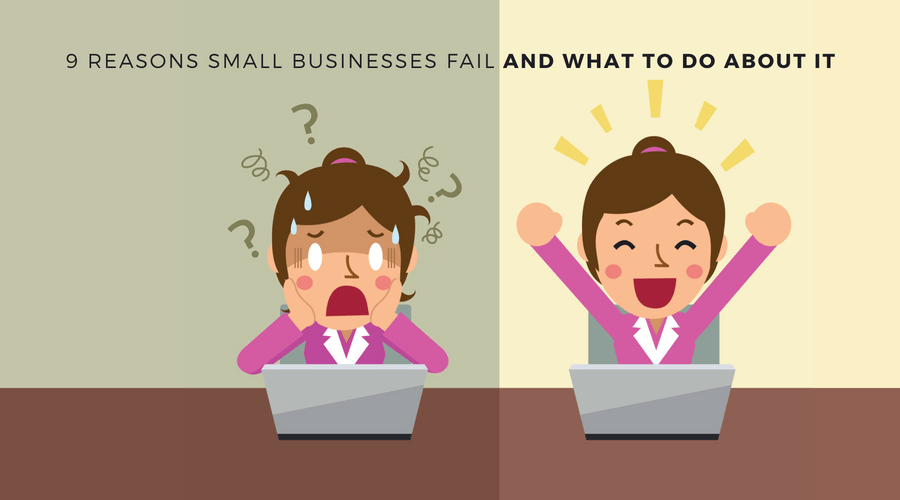9 Reasons Small Businesses Fail and What to Do About It

Only 80 percent of new businesses survive past their first year, and only 30 percent make it past 10 years. Don’t let those statistics stop you from starting your own company. Look at nine common reasons small businesses fail, so you can learn how to avoid some pitfalls.
1. They don’t have a business plan.
Without a business plan, you might struggle to make things work on the fly. But, having a business plan can help you focus, determine what direction you want your company to go in, and figure out how to navigate problems that appear.
To succeed in your business, create a realistic and adaptable business plan before you start. If you’ve already started, take some time now to write a business plan.
2. They’re not flexible.
The business you started yesterday will look a lot different a year from now, five years from now, and especially 10 years from now. Why? Because things change. Your industry will change, new technologies will emerge, and trends will ebb and flow.
If you’re not flexible, you’ll become a dinosaur in no time. Many people love dinosaurs, but no one wants to do business with one.
Be willing to change directions as your environment changes. Consider your business plan as a living document. Review it and update it regularly. You should keep a pulse on your industry, market, and technology, so you’re not surprised when things change.
3. They run out of money.
Starting a business doesn’t haveto cost a lot of money, but it can get expensive quickly. If a company doesn’t have enough money initially, it won’t be able to grow.
Before you start your business, figure out how much you’re actually going to need initially. Then, raise or borrow at least that amount. Regularly review your finances to ensure you have enough money to maintain your business or get it to the next level.
4. They pick the wrong physical location.
If your business has a physical storefront, location is everything. If consumers can’t find you or if you’re not located in the right area, it can be challenging to attract customers.
When you’re shopping for a storefront, don’t just pick something because you can afford it. Instead, make sure you’re in an easy to find location where your ideal customers already go.
5. They don’t have an online presence.
Your customers are online. They’re connecting with their friends, looking for recommendations, and even shopping online. If you’re not online, you could be missing opportunities.
Make sure you have some sort of online presence. It doesn’t have to be anything expensive or time-consuming – it could be social media pages or a Google My Business website. Just make sure there’s something to see when someone searches for you.
6. They don’t listen to their customers.
Your customers know what they want. If they don’t like something you did, they might go online and complain about you. If you don’t respond to that complaint and act on their feedback, you risk losing customers.
When a customer complains about you, listen to them. If there’s anything you can do to fix it, fix it! Learn more about how to deal with negative reviews.
7. They don’t have enough inventory, or they have too much.
Inventory is a double-edged sword. If you have too much, you’re wasting money. If you don’t have enough, your customers might shop with a competitor.
When you’re purchasing inventory for your business, try to buy just the right amount. This may take some trial and error to get right, but if you’re listening to your customers, you’ll be able to determine how much you need of each item. Read also: 5 Tips for Managing Your Inventory
8. They’re not managing their books.
A business owner should always know where they stand financially. Even if an accountant handles your books for you, it’s vital that you know what’s going on.
Regularly review your financial statements so you know where you stand and can correct any problems before they become too hard to fix.
9. They forget about their employees.
Your employees keep your business running. If you don’t treat your employees right, they may look for a new job and leave you. They might even tell people to stop doing business with you.
Work hard to build a strong, healthy, and supportive culture for your employees. If they’re well taken care of and feel genuinely connected to your company, they’ll work hard to help you achieve your goals, so you can continue to grow your business for years to come. Read also: 6 Ways to Show Your Employees You Have Their Back


